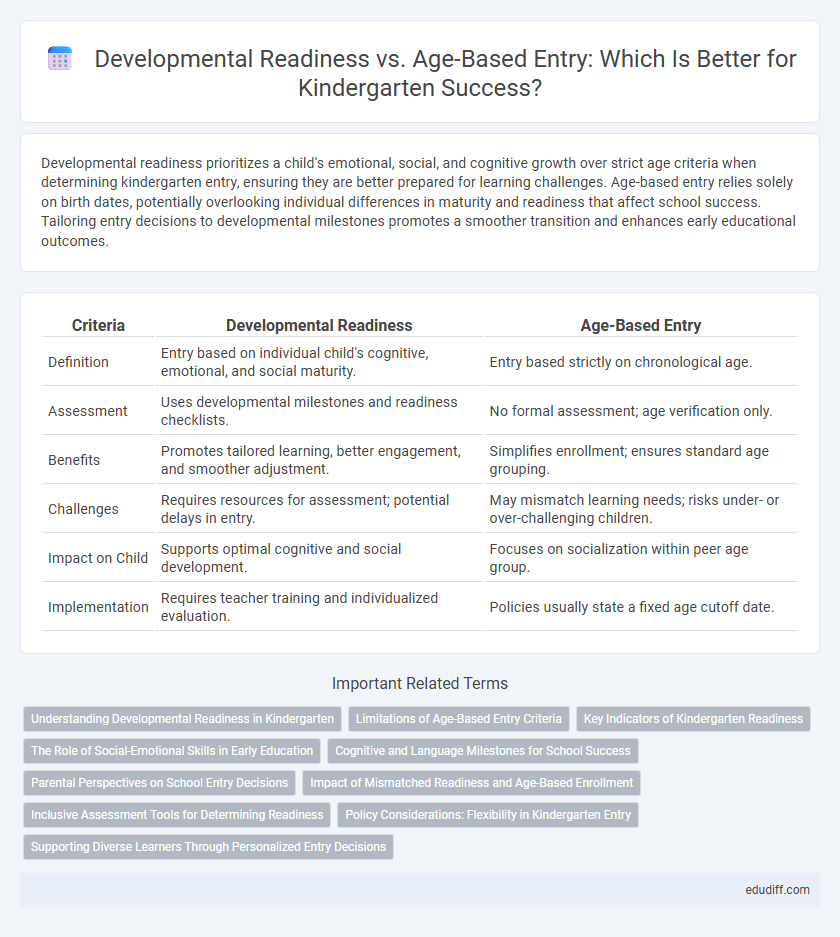Developmental readiness prioritizes a child's emotional, social, and cognitive growth over strict age criteria when determining kindergarten entry, ensuring they are better prepared for learning challenges. Age-based entry relies solely on birth dates, potentially overlooking individual differences in maturity and readiness that affect school success. Tailoring entry decisions to developmental milestones promotes a smoother transition and enhances early educational outcomes.
Table of Comparison
| Criteria | Developmental Readiness | Age-Based Entry |
|---|---|---|
| Definition | Entry based on individual child's cognitive, emotional, and social maturity. | Entry based strictly on chronological age. |
| Assessment | Uses developmental milestones and readiness checklists. | No formal assessment; age verification only. |
| Benefits | Promotes tailored learning, better engagement, and smoother adjustment. | Simplifies enrollment; ensures standard age grouping. |
| Challenges | Requires resources for assessment; potential delays in entry. | May mismatch learning needs; risks under- or over-challenging children. |
| Impact on Child | Supports optimal cognitive and social development. | Focuses on socialization within peer age group. |
| Implementation | Requires teacher training and individualized evaluation. | Policies usually state a fixed age cutoff date. |
Understanding Developmental Readiness in Kindergarten
Developmental readiness in kindergarten refers to a child's cognitive, emotional, social, and physical abilities aligning with their learning environment, rather than strictly their chronological age. Research shows that children who enter kindergarten based on developmental milestones demonstrate improved academic performance and social adjustment. Educators emphasize individualized assessment tools to better gauge readiness, enhancing early childhood education outcomes.
Limitations of Age-Based Entry Criteria
Age-based entry criteria for kindergarten often overlook individual developmental readiness, leading to challenges for children who mature at different rates. Such criteria may result in some children being placed in environments that do not align with their cognitive, social, or emotional skills, potentially hindering their learning and adjustment. Emphasizing developmental readiness ensures a more tailored educational approach, fostering optimal growth and minimizing early academic frustration or disengagement.
Key Indicators of Kindergarten Readiness
Key indicators of kindergarten readiness include cognitive skills such as basic literacy and numeracy, social-emotional development like cooperation and self-regulation, and physical abilities including fine motor skills. Assessing developmental readiness involves evaluating these milestones rather than relying solely on chronological age for entry. Emphasizing individual progress ensures children engage effectively in learning environments designed to foster growth and confidence.
The Role of Social-Emotional Skills in Early Education
Social-emotional skills such as emotional regulation, empathy, and cooperation play a critical role in determining developmental readiness for kindergarten, often outweighing chronological age. Children who demonstrate strong social-emotional competencies are better equipped to engage in classroom routines, build positive peer relationships, and adapt to new learning environments. Prioritizing developmental readiness over strict age-based entry promotes a more tailored and supportive early education experience that fosters long-term academic and social success.
Cognitive and Language Milestones for School Success
Developmental readiness for kindergarten entry emphasizes assessing cognitive skills such as problem-solving, attention span, and memory alongside language milestones like vocabulary growth and sentence formation, ensuring children possess the foundational abilities needed for academic success. Age-based entry often overlooks individual variations in these domains, potentially placing children in learning environments that do not match their developmental stage. Prioritizing developmental readiness supports tailored educational approaches, fostering better adaptation and achievement in early schooling.
Parental Perspectives on School Entry Decisions
Parental perspectives on school entry decisions often weigh developmental readiness more heavily than strict age requirements, emphasizing individualized growth markers such as social skills and emotional maturity. Studies reveal that many parents prioritize their child's ability to adapt and thrive in a structured environment over chronological age benchmarks. This approach aligns with research suggesting that developmental readiness assessments can lead to more positive educational outcomes and smoother transitions into kindergarten.
Impact of Mismatched Readiness and Age-Based Enrollment
Mismatched developmental readiness and age-based enrollment in kindergarten often lead to challenges in social, emotional, and cognitive growth, as children may struggle to keep pace with curricular demands. Research indicates that children enrolled based solely on age may experience increased frustration, lower self-esteem, and hindered academic progress due to insufficient preparation for classroom expectations. Tailoring kindergarten entry to developmental milestones rather than chronological age supports better learning outcomes and long-term educational success.
Inclusive Assessment Tools for Determining Readiness
Inclusive assessment tools for determining kindergarten readiness prioritize developmental milestones over chronological age, offering a comprehensive evaluation of a child's cognitive, social, emotional, and motor skills. By using tailored, culturally responsive instruments such as observational checklists, dynamic assessments, and parent-teacher rating scales, educators can more accurately identify individual strengths and areas needing support. This approach fosters equitable early education entry, ensuring each child is placed in an environment that matches their developmental needs rather than solely their age.
Policy Considerations: Flexibility in Kindergarten Entry
Policy considerations emphasize flexibility in kindergarten entry to accommodate developmental readiness rather than strictly adhering to age-based criteria. Recognizing individual differences in cognitive, social, and emotional development supports tailored school entry that promotes optimal learning outcomes. Implementing assessment tools and parental input frameworks enhances decision-making for enrollment timing, fostering inclusivity and reducing academic or social challenges for young learners.
Supporting Diverse Learners Through Personalized Entry Decisions
Developmental readiness assessments provide deeper insights into each child's social, emotional, and cognitive skills, allowing educators to tailor kindergarten entry to individual needs rather than strictly following age cutoffs. Supporting diverse learners through personalized entry decisions promotes equitable access to early education by recognizing varied growth patterns and ensuring children enter when they are best prepared to thrive. This approach fosters a more inclusive classroom environment that accommodates differences in learning readiness, ultimately enhancing long-term academic and social success.
Developmental readiness vs Age-based entry Infographic

 edudiff.com
edudiff.com